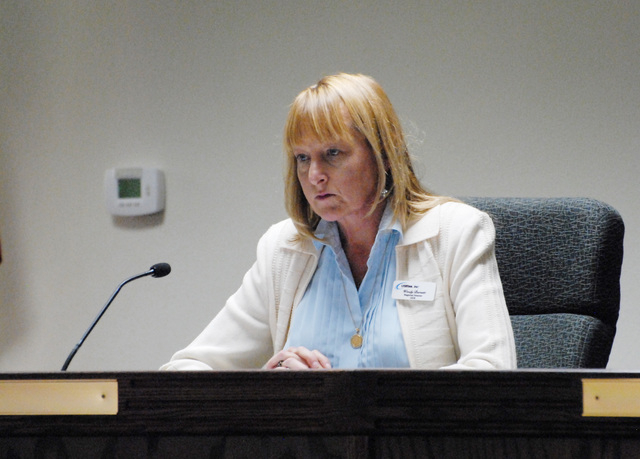New residents may be forced to allow well monitoring
Fears of well owners having to meter their wells have so far been unfounded. Still, a Basin 162 Groundwater Management Plan Advisory Committee suggestion heard Monday may raise more anxiety for well owners.
Committee members recommended meters be required on all new wells.
The committee is attempting to draft a groundwater management plan for Pahrump Valley. The state engineer is allowed under a law passed in the 2011 state Legislature to regulate water rights by priority date after 10 years for basins with an over-appropriation of water rights to the annual recharge, such as Pahrump, unless a groundwater management plan is approved.
The suggestion drew top billing, which meant committee members want immediate action. The committee repeated complaints there were too few people willing to participate in a voluntary well monitoring program — only six so far.
“The state engineer has said something has to happen here, that he can tell domestic wells you’re not going to water outside any more. Well I’m on a domestic well and I do water outside and I want to be able to water outside and I think we need a program for consumptive wells that gives the state engineer something so he doesn’t have to take those steps for a domestic well,” said committee member Wendy Barnett, president of Utilities Inc. of Central Nevada.
Consultant Oz Wichman suggested new well owners could be required to report their data to the state engineer annually.
“They could begin to track average well use so when they make a decision they’re making a decision closer to hard numbers and not on assumptions because you’re making decisions today based on assumptions,” Wichman said.
But committee member Kristian Bentzen said they shouldn’t be afraid of the state, adding they were putting the cart before the horse. He said the county has 10 years to come into compliance.
“I’m in favor of all new residents, let me emphasize that, new residents, to have a meter on there to help compliance, to help the state engineer,” committee member Greg Dann said. “We have to think about the future and we need information and our newly-organized volunteer well metering program isn’t really taking off. So I’d say let’s put it on the new residents, get them on board and they’ll be less resistant because they’re new and this leaves the current people out.”
Committee member Walt Kuver felt the water level was more critical than usage figures. But he said the minute owners get a meter on their well, usage will drop, adding it would be a good tool to make people aware of the declining water level. Data from the county’s geoscientist, Levi Kryder, showed 85 percent of domestic wells have suffered a decline in water levels in the past nine years.
“Where you have the greatest drop in the water level is where there’s the highest density of domestic wells. So we are having discussions about managing the basin differently in different areas,” Wichman said.
Nye County Water Board Chairman John MacLaughlin said there’s often references to the 11,200 wells sunk in the Pahrump Valley. But he asked, “How many of those are nothing but on a pipe that’s in the ground on an empty lot? When you sink a pump down into that hole I think that needs to be a time you put in a meter.”
The committee rejected the idea of using Smart Meters.
“We are looking to a community to solve a community problem and I say people can fill out a card and mail it in to wherever they need to mail it in, on what their consumption is because if we can’t give good data as a community we’re not going to solve a problem as a community and if we don’t do it as a community it’s not going to get solved by us anyway, it’s going to be done by the state engineer,” Barnett said.
Dann wanted the committee to consider easing the process for boundary line adjustments, for people with lots too small to drill a well. Board chairman Greg Hafen II suggested waiving county fees for boundary line adjustments. Barnett said she’s obligated to charge a third party fee for boundary-line adjustments, but would be willing to follow suit and petition the Public Utility Commission to waive that tariff if the county does.
There was almost no support for a suggestion to prohibit private wells within a utility service territory. Barnett said it was an overly simple statement.
“UICN is much different than Pahrump Utilities or Desert Utilities with lots of areas with no infrastructure and literally a million dollars to get the infrastructure there,” Barnett said. But she added, “somehow we have to encourage pipe over domestic wells in an over-appropriated basin. There’s no doubt someone on a utility system that gets a monthly water bill is going to be using less water than somebody on a domestic well.”
“There are so many properties beyond the end of your pipes it would be so prohibitive to hook them up,” Bentzen said. “Can you just redraw the tariff area in and now they can submit to get their well?”
Barnett said she can’t refuse service in the UICN service territory. When her service territory boundaries change, it’s when a company like Corrections Corporation of America requests to be annexed, she said.
“Do I think with the challenges we’re facing in this basin, the work that’s being done on the master plan and zoning, that there are benefits in changing the defining line of my service territory? Yes. Do I think it is simple? No,” Barnett said. She said the Nevada Southern Detention Center is like an island, with water and sewer lines running down Mesquite Avenue but UICN is unable to service properties on either side of the street where Nye County has talked about establishing an industrial park in the area.
Two members wanted immediate action requiring all new domestic wells to be limited to half an acre foot of water. Hafen said this would be a means of enforcement with penalties of up to $10,000 per day for going over the allotted amount.
Wichman disapproved.
“To do nothing on domestic wells is a valid option, but only after you collect the data. So if you say you’re going to limit it to half an acre foot for all new domestic wells then you’re going to make that decision without the benefit of hard numbers,” he said.
Nye County Water District General Manager Darrell Lacy said nothing would stop that property owner from purchasing water rights for a garden or orchard.
Committee members were lukewarm to the idea of requiring the donation of an acre foot of water rights before a well can be drilled. While an acre foot of water rights averages $3,200 right now, Wichman said during the boom they went for as high as $15,000 per acre foot.
“Once again the focus is on retiring paper water rights rather than actual water. Paper water rights are just that, they’re paper. If we find a way through growth control that they’ll never be used, then they’ll no longer be an issue,” Kuver said. He marked it a lesser priority, for action in 10 years.
A suggestion to put a minimum depth on drilling a domestic well as an educational tool was scrapped.

















